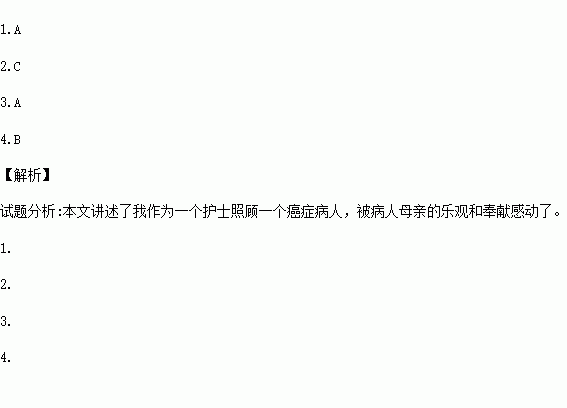题目内容
The world was mysterious (神秘的) when I was a child, so miracles (奇迹) were welcome wonders. Now, there doesn’t seem to be space for them in this world I so intelligently understand.
Perhaps it’s from years of working around sick and often dying children, watching time and time again as a child slips away from the arms of a begging mother. I have stopped hoping as the parents around me hope.
I recently cared for a patient near the end of his life. Medically speaking, his situation was hopeless, which made me feel helpless and defeated.
His mother came in to see him. I had prepared myself to support her, imagining she would crumble (崩溃) into a pile of tears.
“Our God is faithful,” she said, with a smile on her face and the sunshine of hope in her eyes.
“Cancer is faithful,” I muttered (嘀咕) in my mind.
“We still believe he can heal him,” she continued, as if she had heard what I was thinking.
I provided updates on his body. In a laundry list of updates, perhaps two things were positive. She thanked me for the information, repeating back the minor positive notes I had given.
I brcame kind of angry. And I wanted to sak, “Do you really not understand the gravity (严重性) of this illness?”
And then, yet again, as if she had heard me, she replied with this: A positive attitude gives us power over our circumstances, rather than allowing our circumstances to have power over us.
I was shocked. Here I was, judging her positive attitude as a fault. I completely disregarded the choice to believe in something more powerful than me, more healing than the doctors on our team. It wasn’t blind faith. It was strength and devotion.
When I came out of the room, tears welling in my eyes, I sat at my computer and looked
down at a small plate of candies she must have left for me on her way into the room. A hand
written note was laid above them: Kate, your devotion is so appreciated, S.
S, it is your devotion that I am appreciating today. Because of you, I am begging again to
believe in miracles.
1.The author is probably a ________.
A.nurse B.patient C.teacher D.mother
2.Before seeing the patient’s mother, the author thought that the patient ________.
A.would recover soon
B.had got much better
C.was going to die of cancer
D.might make a miraculous recovery
3.Why was the author angry with the patient’s mother?
A.Because of her optimism.
B.Because of her impoliteness.
C.Because she couldn’t stop crying.
D.Because she was always complaining.
4.Finally, the patient’s mother made the author become ________.
A.more patient B.more positive
C.more aggressive D.more sympathetic
 小夫子全能检测系列答案
小夫子全能检测系列答案
